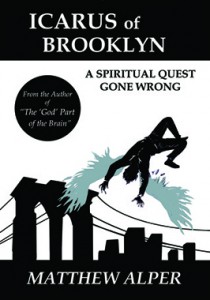Icarus of Brooklyn: A Spiritual Quest Gone Wrong

In the last decade we have allowed the primary interest of dignity and the human element in humanism to be slowly superseded by a popular anti-theism that declares religious people stupid, and us intellectually superior. Case closed. What we need are role models who exhibit that curiosity and love of humanity that commit us not only to ask how it all came to be, but also, “why?”
Picture a precocious child whose tireless energy and boundless curiosity perennially lead his mother and father to the point of exhaustion. He’s the kind that questions the exercise of pre-meal prayer: “What is the point? It certainly didn’t make the food taste better.” One evening the boy asks his father:
“So everything there is, God made?”
“Correct.”
“Why? Why did He make the universe?”
“Jesus Christ, Matthew! I don’t know. Why does anyone do anything?”
“Because they want to?”
“Exactly! That’s why God made the universe. Because He wanted to.”
“Why? Was it fun for Him?”
At this point the father capitulates: “I’m exhausted. He’s got a question for everything. It’s like fighting a hydra. You answer one question, and two new ones take its place.”
The boy is a young Matthew Alper. Alper of course is the author of the highly acclaimed 1996 book, The God Part of the Brain: A Scientific Interpretation of Human Spirituality and God, a rather ambitious project to explore religion as a natural phenomenon from the point of understanding rather than serving as an advancing polemic. Alper set out to ask where religious experience comes from, and if said experience presented any particular advantages. Some sixteen years later, Alper has returned with Icarus of Brooklyn, a personal narrative that’s a prequel of sorts to The God Part.
 Alper is quite the interesting character. Growing up in a Jewish family in Brooklyn, New York, his journey included experimenting with psychedelics, expulsion from Vassar, getting a degree in philosophy from SUNY Stoneybrook, teaching high school in a Brooklyn project, driving a “Good Humor” ice cream truck, tutoring in the Philippines, and even truck-smuggling in Central Africa.
Alper is quite the interesting character. Growing up in a Jewish family in Brooklyn, New York, his journey included experimenting with psychedelics, expulsion from Vassar, getting a degree in philosophy from SUNY Stoneybrook, teaching high school in a Brooklyn project, driving a “Good Humor” ice cream truck, tutoring in the Philippines, and even truck-smuggling in Central Africa.
Alper’s writing style is conversational yet complex. While The God Part allowed the educator in him to present complicated issues in a comprehensible manner, Icarus is more raw, with a compelling and organic authenticity—vulnerable but not self-indulgent—from a man who has truly lived. In it Alper exudes that abrupt yet jovial, no-bullshit affect that is unmistakably New York. In terms of their relation to other contemporary works in the atheist genre, both Alper’s books refreshingly avoid admonishing or bullying their subjects.
Culturally, we love assassins. We celebrate those who ride at our behest and eviscerate the intolerable, not just to vanquish the unpalatable but to champion the embarrassment of its source. Both sides of the aisle profit from this cottage industry of ad hominem, sweeping generalizations, and enough men of straw to protect a goodly-sized continent of farm fields. It stirs us to create divisive and derisive false dichotomies between the sinister and the gullible, and the brilliant and forthright (which side would you rather be on?). As humanists, our former banner summum bonum was the dignity of the individual, which has been more recently superseded by a dedicated anti-theism. When The God Part of the Brain explores the nature of religion, however, it does so with maturity, sincerity, and an intellectual integrity sorely needed as a role model for today’s nonbelievers. As a textbook on religion as a natural phenomenon, Alper’s book is matter of fact investigation, yet there is a really interesting story behind the author. Alper’s second book draws back the curtain.
Through Icarus’ compelling pers-onal narrative, Alper puts an endearing and identifiable face upon the destruction of the ego, the search for spiritual truth, and the reestablishment of the self. From a toddler discovering his ego through the establishment of the self and the other to a young child learning about death and the concept of God through an ephemeral prize goldfish, Alper sets off on a personal journey of disillusion, drugs, and nearly dying by his own hand. But it’s much more than a tale of a young man struggling to find meaning in his life; Icarus maps deconstructive existentialism and presents a well-distributed subtext of greater philosophical issues (for example, our place in the world and the problem of suffering). Through the course of events Alper tries to find his place in an ever-expanding universe, tests his boundaries of experience, and eventually loses all attachment to any sense of self-identity. He takes us on a voyage through childhood, adolescence, and adulthood in which his struggle to find God nearly kills him.
As an adolescent Alper experimented with marijuana and psychedelics. The rebellious teen took blotter hits and a lesson from a shamanic Coney Island acid dealer named Ray-Ray. His drug use extended into his short time at Vassar College, and his existential crisis deepened after his expulsion. While vacationing with his parents during this time, Alper was bitten by a raccoon. The following exchange ensues back in the cabin:
“Well I took LSD, and…”
“You took WHAT!!!” My father shouted.
“I took LSD, and I’m pretty sure what I’m feeling now has something to do with it. Either that or I have rabies.”
“LSD or rabies? What are you saying?”
Alper masterfully layers a great story that ambushes you at the right moment with biting humor (pun intended). He asserts that, like the namesake of the book, he flew a little too high in his quest for answers. Yet, unlike Ovid’s character, he lived to tell about it.
Icarus also ranges into more serious emotional depth (including a failed suicide attempt). In his pain, disillusionment, and confusion Alper places a human face on an existential journey and calls us to engage more deeply with him as our philosophical tour guide. In short, Icarus soars.
As a humanist activist and thinker, I read a lot by and about those who sculpted our philosophy. I host a book club featuring the works of Thomas Paine, Voltaire, Baron D’Holbach, David Hume, Friedrich Nietzche, Charles Darwin, and Sigmund Freud. I’ve also read the modern writers, including the “Four Horsemen,” who I find entertaining albeit a bit reductive. And though horses may be exciting as gallivants, they often leave some messy surprises in their wake. We need more thinkers like Matthew Alper. We need to cultivate less sloppy thinking, and more honesty and dignity. The byproduct of Alper’s work may be a corrosion of the foundations of supernaturalism and superstition, but his goal is far superior: that of learning, understanding, and truth.
